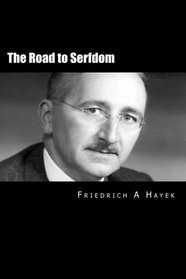Search -
The Road to Serfdom
The Road to Serfdom
Author:
Over Two Million Copies SoldThe Road to SerfdomByFriedrich A. HayekCondensed EditionThe Road to Serfdom is a book written by the Austrian-born economist and philosopher Friedrich von Hayek (1899?1992) between 1940?1943, in which he "[warns] of the danger of tyranny that inevitably results from government control of economic decision-making throu... more »
Author:
Over Two Million Copies SoldThe Road to SerfdomByFriedrich A. HayekCondensed EditionThe Road to Serfdom is a book written by the Austrian-born economist and philosopher Friedrich von Hayek (1899?1992) between 1940?1943, in which he "[warns] of the danger of tyranny that inevitably results from government control of economic decision-making throu... more »
ISBN-13: 9781522918387
ISBN-10: 1522918388
Publication Date: 12/26/2015
Pages: 50
Edition: Condensed Edition -
Rating: ?
ISBN-10: 1522918388
Publication Date: 12/26/2015
Pages: 50
Edition: Condensed Edition -
Rating: ?
0 stars, based on 0 rating
Publisher: CreateSpace Independent Publishing Platform
Book Type: Paperback
Other Versions: Hardcover, Audio Cassette
Members Wishing: 6
Reviews: Amazon | Write a Review
Book Type: Paperback
Other Versions: Hardcover, Audio Cassette
Members Wishing: 6
Reviews: Amazon | Write a Review
Genres:




